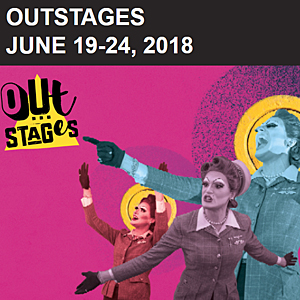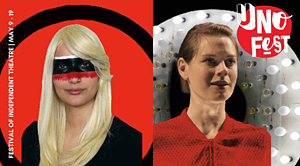Spit Delaney’s Island at Theatre Inconnu December 3-19, 2015. A review.
As an islander, born and bred, no one speaks to me like author Jack Hodgins. When I’m reading his short stories and novels, the smell of the sea and pictures of impenetrable forest fairly leap from the page—his vivid characters reminiscent of some of the eccentrics I remember growing up as a logger’s daughter on the West Coast. Thus, imagine my excitement last December when Theatre Inconnu announced they were working with Hodgins and playwright Charles Tidler to adapt Spit Delaney’s Island, Hodgings début collection of short stories, for the stage. I’ve waited a year for this moment and am not sure of my ability to remain objective, given the subject matter.
It’s the early 1970s; collision—of mores, life-style, and work—is underway. Spit Delaney (Clayton Jevne) is having nothing to do with these new-fangled ways, remaining firmly rooted in his past as the engineer on steam locomotive Old # One, now consigned to a museum in Ottawa. No amount of pleading on the part of his feisty and plain-speaking wife Stella (Susie Mullens), explaining on the part of his boss (Perry Burton) or ridicule from his children Cora (Catriona Black)—happy to spend hours attending to her toilette—and Jon (Perry Burton)—nose buried in a book—will convince him that his is not the right and only way. Perplexed and baffled, he’s a man completely out of step with the irreducible passage of time, consigned to a rock on the side of the highway as vehicles whizz by and the occasional hitch-hiker tries to make small talk.
My father was such a man as this, the same age as Spit. When hippies started showing up on the West Coast of Vancouver Island, men, bound by tradition to the forests and the sea, had little time for their carefree fashions or their complete (to them) disregard for economic reality. A life well-lived meant pride in a job well done, a marriage that endured and children who listened.
As authority begins to be questioned Spit un-anchors from reality—caught in a world of what was and what is, the real and the imagined, myth and the everyday.
Hodgins is a chronicler of a way of life long-gone, his language capturing both the practicality of the everyday and the magic of the mystical. Moments on Long Beach, when Spit begins to have visions of sea monsters, drive the story deep into the realm of magical realism.
Sound design by Karen Lee Pickett, who also directs, accentuates the mood—waves crashing gently on the beach, seagulls crying (“like they’ve lost everything”), car traffic on the highway, the screech of the house gate as Stella piles Spit’s boxes on the driveway.
A profound sense of grief pervades. Spit is in grave danger of sinking—given to fits, clutching a tape of his beloved engine’s chug-a-chug and yet, he soldiers on, going through the motions on a family trip through Europe—Black and Burton’s portrayals of bratty teenagers bring smiles of recognition for family dynamics at play—and trying to woo his wife back.
Jevne is solidly anchored in this laconic working class character, complete with the engineer’s cap, overalls and work boots to prove it. As he moves from disbelief and disorientation towards acceptance, the audience begins to root for a home-grown anti-hero, a symbol and testament to all the individuals who dreamt of a better life, far from civilization on the far edge of Canada.
Playwright Charles Tidler’s adaptation sings with a language that any Islander will recognize instantly. Dialogue moves between introversion, as Spit wrestles with his demons, and snappy banter and come-backs when he engages with family, friends and outsiders.
Costumes by Shayna Ward blend traditional 70s era working class clothes (house dresses, work clothes, lounge wear) with the flamboyant attire of young people un-hinged by then from convention.
Spit Delaney’s Island takes place on a full thrust stage with the audience seated two deep on three sides, close to the action and sentiment of the play.
Under Karen Lee Pickett’s sensitive direction, the cast itself navigates “the dividing line between what is and isn’t” and the difficult territory of rendering homage while highlighting the truly unique nature of the characters of Vancouver Island (anyone who has lived here for any length of time will instantly recognize the counter-culture, dippy poet Phemie (Black) and her desire to “hear the mountains speak”.)
I walked away full of pride for an island way-of-life, and melancholy for a time now-gone.
For 28 years Theatre Inconnu has been bringing “thought-provoking and affordable quality theatre to the community”—if you have never attended one of their shows up until now, make yourself a promise to do so, and learn a little bit more about the history of this place and the people who call it home.
Spit Delaney’s Island by Charles Tidler, from the stories of Jack Hodgins
Theatre Inconnu, 1923 Fernwood Road
December 3-19, 2015
Tickets: $10-14 with ½ price tickets on preview night December 1st and Pay What You Can December 9th
Ticket Rocket online or by phone 250 590 6291. Or, directly through Theatre Inconnu 250 360 0234 or email tinconnu@islandnet.com
Directed by Karen Lee Pickett.
Featuring (alphabetically): Catriona Black, Perry Burton, Clayton Jevne & Susie Mullen
Costumes by Shayna Ward
Lighting by Clayton Jevne
Sound by Karen Lee Pickett
Stage Managed by Sylvia Lindstrom
Preview 8pm: Dec 1
8pm: Dec 3, 4, 5, 9, 10, 11, 12, 16, 17, 18, 19
2pm: Dec 5, 12, 19
After the 8pm show on Saturday, Dec 5th, Charles Tidler (playwright) will speak after the performance, along with the director and cast members.






Beautiful, Janis, a touching review full of intelligence, experience and love of Vancouver Island. Thank you.